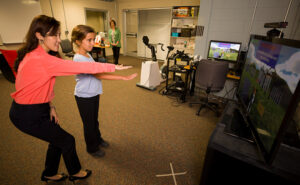 University of Georgia researchers have been awarded a $3.3 million grant from the National Institutes of Health to use virtual reality to help children develop a more active lifestyle.
University of Georgia researchers have been awarded a $3.3 million grant from the National Institutes of Health to use virtual reality to help children develop a more active lifestyle.
The Virtual Fitness Buddy Ecosystem: Using Digital Technology to Promote and Sustain Moderate to Vigorous Intensive Physical Activity in Children will fund a five-year program through the after-school program sponsored by the Metro Atlanta YMCA. Children ages 6 to 10 years old will participate with their parents in the program.
“With this grant, we will try to encourage kids to exercise more, learn how to communicate with their parents regarding the exercise, and maintain and sustain a level of physical activity that they experience after school,” said Sun Joo “Grace” Ahn, associate professor of advertising in UGA’s Grady College of Journalism and Mass Communication and principal investigator for the study.
Each child participating in the study will wear a personal fitness tracker, like a Fitbit, and set personal physical fitness goals.
Kyle Johnsen, an associate professor in the School of Electrical and Computer Engineering in the UGA College of Engineering, is designing the informatics of the project. Johnsen’s tasks include making a virtual pet interact naturally with children, integrating parent communication into the loop through text messaging, and analyzing the wealth of data collected by activity monitors and interaction logs.
“I have been collaborating closely with Dr. Ahn on this project for more than five years and through numerous pilot studies at 4-H camps and local schools, we showed that virtual pets show great promise for increasing physical activity in children, at least in the short-term,” said Johnsen. ” Now, we are excited to design the system for prolonged use and begin the journey to address the question of long-term benefits of the approach.”
One of the keys to the program will be social support from the parents. Every time the child participates in physical activity, a virtual buddy kiosk will send a text message to the parents notifying them of the activity, even when they are not with the children. They can, in turn, send a message back to the child encouraging them and motivating them to maintain the activity. Parents can also closely monitor the child’s physical activity progress over time through a password-protected website specially created for the project.
Once the physical activity goals have been reached, children will be able to interact with a personalized virtual pet as a reward. Using these everyday communication devices, the virtual pet, children and parents will be able to interact seamlessly together to create a robust ecosystem of support so that children can integrate physical activity into their daily lives.
Ahn says a lot of parents want to be involved with their child’s activity level and have good intentions of doing so, but don’t have the resources available to them while they work.
“We are presenting an intervention that allows them to be involved and that allows their children to be involved,” said Ahn. “We see a lot of excitement and willingness to take part in this.”
Ahn predicts that by harnessing the power of technology to connect people and devices, physical activity among children will increase and will be maintained over extended periods of time.
“Dr. Ahn’s work explores issues critical to the health and vitality of American children, using the very latest in digital technology,” said Charles N. Davis, dean of Grady College. “Her research really represents Grady’s depth in emerging media technologies that can be used to address so many different issues of vital importance to citizens.”
Several successful pilot studies have already been conducted over a three-day time period to test the feasibility of bringing virtual reality to children of this age group. This grant allows the study to become much larger and increase the trial period to three months and include 720 children and their parents.
“With an innovative and multidisciplinary approach, Dr. Ahn and her colleagues are working to help young people lead healthier and more active lives,” said Senior Vice President for Academic Affairs and Provost Pamela Whitten. “They exemplify how the breadth of the expertise at the University of Georgia makes this institution uniquely positioned to address some of the most important challenges facing our state and world.”
When the study is complete, a three-month, six-month and 12-month follow-up will be conducted to see if the physical activity levels were sustained. Self-reports of data evaluating the continued interaction between the parents and children will be recorded, along with physical activity levels as read by the personal fitness trackers. Results will be compared with a control group that will have the physical fitness trackers, but not the virtual buddy kiosk nor the parental interaction.
In addition to the benefits of increased physical activity among children and increased involvement with the parents, Ahn said the program has the potential to reduce labor costs with traditional methods of hiring and training personnel who work as physical coaches.
Four other researchers at UGA are working on this grant: Michael Schmidt, associate professor in the Department of Kinesiology in the College of Education; Stephen Rathbun, professor in the Department of Epidemiology and Biostatistics in the College of Public Health; Leann Birch, the William P. “Bill” Flatt Childhood Obesity Professor in the College of Family and Consumer Sciences; and Margaret O’Brien Caughy, the Georgia Athletic Association Professor in Family Health Disparities in the College of Family and Consumer Sciences.
Writer: Sarah Freeman, 706-201-5373, [email protected]
Photo: Sun Joo “Grace” Ahn, left, helps nine-year-old Maddie Lacey of Watkinsville interact with the virtual buddy fitness kiosk in the Games and Virtual Environments Lab at Grady College of Journalism and Mass Communication, while Maddie’s mother, Cara Lacey, looks on. (Credit Andrew Davis Tucker)


